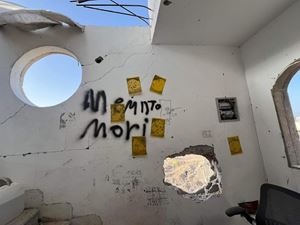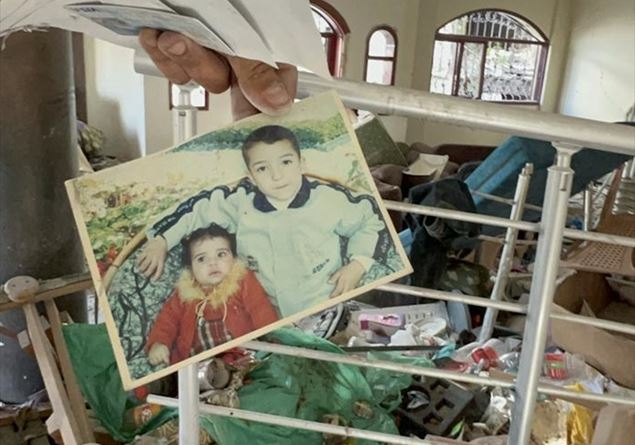Let’s start today, from the present. How is it, Yara? Where is it and what is doing right now?
Well, to tell the truth, I don’t even know with certainty. It is like a Russian mountain of emotions. Fortunately, there are days that are fine, but at the end of the day it always strikes me with a strong sense of guilt to be alive and in relation to sure, while my family and friends in Gaza do not even have to eat. Today I study Medicine at the State University of Milan, after having moved from the University of Al-Azhar, to Gaza.
His life has changed radically in a few hours. She had arrived for an exchange project, she became a refugee. What did you feel in the first days after October 7th?
Fear, panic, sadness, anger and a profound sense of guilt. It was the first time in my life that I was far from my family. I had arrived for a one month internship at the Chieti hospital, so it should have been a short experience of only 30 days. Instead, after more than 20 months, they are still in Italy.
His family remained in Gaza, under the bombings. Has he managed to keep in touch with them?
Yes, more or less. A few days I could, others don’t. I could not make video calls, but at the beginning some international phone calls was possible, even if increasingly difficult as the situation worsened. One of the strongest experiences was a phone call with my mother in October. I felt the bombings in the background, very strong. She said to me: “Luckily you are in Italy, so at least the name of our family continues with you.” Because there are families who have been completely eliminated by the civil register. That was the toughest phone call from all genocide.
He lost 33 members of his family. How does it live with such a great pain, living on the other side of the world?
There are no words. It is an immense pain, which makes you lose your faith in everything. A wound that does not pass over time. In December 2023, my aunt tried to escape from the bombings with her four children, bringing a white flag as a sign of surrender. They were affected directly. Everyone died. Their bodies were found only in March 2024, when some neighbors cleaned the garden and, recognizing the clothes and a phone, we understood that they were them. It was the hardest moment. They were the first five members of my family I lost. Every time I think about it, I can’t imagine that my aunt, which I loved so much, has made such a similar end. The greatest pain is not even able to greet it.
Her father said to her: “They will take everything away, but not your culture”. What does it mean for you today to carry on the Palestinian culture here in Italy?
It is both a duty and a pleasure. It makes me feel alive. Carrying on the Palestinian culture means honoring my roots, the history of my family and my people. Every day I try to make known the true Palestine: made of hospitality, resilience, music, cuisine, art, love for the earth. It is a way to resist the idea that we can be deleted. Telling who we are, with pride and dignity, is an act of memory and existence. It is my way of fighting prejudices.

Why did you choose medicine? And what does he dream of becoming?
In 2008, at 7 years old, I lived my first war. I remember I asked my mother: “Who are those people on the street who are not afraid and run among the ambulances?” She replied that they were doctors and rescuers. And I said to her: “When I grow up I want to be like them.” From that day my passion was born. Today I dream of becoming plastic surgery, to help those who have lost arts to find dignity and quality of life.
His family managed to escape from Gaza to April. How was that moment?
It was like seeing the sun on October 7th, the one I hadn’t seen then. An immense emotion. After months lived in daily anguish, knowing that they were alive was like returning to breathe. But happiness mixes with pain: not everyone did it and nobody returns equal to a similar experience. Seeing them save gave me the strength to go on.
He saw his dreams destroyed several times. Yet it continues to hope. Where do you find the strength to resist and build something here in Italy?
I believe this force is born inside every Palestinian. Sometimes I don’t even know how we resist. But it is in our blood: the determination to survive, not to let us break. My strength comes from my family, from my people, from those who remained in Gaza and continue to resist. Each exam, every word said on Palestine, every solidarity gesture is for them. Dreaming is my way of resisting.
It is very active in solidarity networks and protests for Palestine. How do you judge the mobilization of students and civil society in Europe?
I am very proud of it. Often they paint us as an apathetic generation, but it is not true. I see busy guys, curious, willing to inquire about themes that seem far away. The solidarity of students, collectives, ordinary people gives us strength. It makes us feel less alone. It reminds us that humanity and justice have no boundaries.
She was born in 2001, in a Gaza already under siege. And he lived five wars. What childhood and adolescence has it had?
I prefer to remember beautiful things: my family, friends, affection. But the reality was hard. Six hours of electricity per day, water on alternate days, no freedom of movement. It was a complicated life. We grew between rubble and dreams. And even if we tried to be children, the war stole a part of the childhood and made us become adults too quickly.
What is Nakba for you today?
These are the stories of my grandparents, always with tears in the eyes. They speak of houses, lands, stolen lives. As a child, those stories weighed me, but today I understand why they never stopped telling them: because they didn’t want us to forget. Nakba is not just a past event, it is a still open wound that is handed down. Telling today is my way of not making her die.
What do you think of the silence or slowness of the international community?
It’s a shame. How can you remain silent in front of children reduced to pieces, collected in plastic bags? And those who don’t die under the bombs are starving. This silence is complicity.
What are you missing from Gaza?
My family, my friends … and the sea. The sea of Gaza is a part of me. I miss the smell, the noise, the freedom I felt looking at it.
What message does he want to leave the Italians who will read this interview?
Thanks for welcoming me. You are a people brother. I thank you with all my heart, and I only ask you this: don’t turn to the other side. Choose to stay on the right part of the story.
Photo by Gaza by © Yara Abushab


